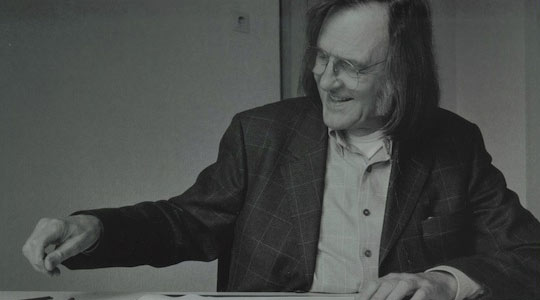Ernstalbrecht Stiebler
[DE]

Kompakt sublabel m-minimal sites Ernstalbrecht Stiebler (born in Berlin in 1934) as the first German composer to explore minimal techniques in his works in reaction to the serialism dominant in the mid-twentieth century. Though his compositions are relatively unknown, Stiebler has garnered enormous respect for his long career in radio production.
Stiebler served as new music editor at Hessischer Rundfunk for over 25 years, where he supervised recordings of Morton Feldman, John Cage, Alvin Lucier, Giacinto Scelsi, Earle Brown, and Christian Wolff, among others. As an avant-garde composer in his own right, he has written for piano, organ, chamber ensembles, and choirs. He cites his three principal compositional concerns as “sonority, rhythm, and duration" – accordingly, he is regarded as “one of the few ‘grandmasters’ to musically capture so much with so little means” (m=minimal). As with composers from minimalist schools like Berlin’s Wandelweiser, the works are not meant to be easy – rather, they demand close concentration from their listeners. The reward, however, is a transcendent experience of shifted time perception.
Stiebler studied composition and piano at the Musikhochschule Hamburg and in Darmstadt between 1958 and 1961. Karlheinz Stockhausen was his mentor in 1959. His first composition, “Extension I”, was performed in 1963 and was understood as an oppositional answer to the serialist style popular at the time. His “Sequenz II” for cello and tape (1984) was released by m=minimal in 2012 as a new recording with cellist Agnieszka Dziubak. In 2013, the same label released the CD Ton in Ton, featuring the composition (and his first for chamber orchestra) of the same name, recorded for the occasion by renowned contemporary music troupe Ensemble Modern. Mit der Zeit followed in 2014 and consisted of four more original works: “Im Atem”, “Schwebend”, “Quart Solo”, and “Mit der Zeit”.


